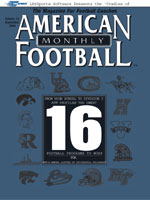AMERICAN FOOTBALL MONTHLY THE #1 RESOURCE FOR FOOTBALL COACHES
Article CategoriesAFM Magazine
|
LSUA Commitment to Special Teams© More from this issue It is an honor to represent Coach Nick Saban and the entire LSU football program, and to share some thoughts on our organizational structure that we feel are paramount to having consistent and productive special teams play. Almost every program claims that they are committed to special teams, but as Coach Saban constantly reminds us, “Your actions speak so loud I cannot hear what you say.” At LSU, we feel that developing an organized, systematic approach to all phases has a much greater impact on player commitment and performance than mere lip service. Set forth below are “actions” we feel tangibly demonstrate a true commitment. 1. Head Coach Involvement: I a....The full article can only be seen by subscribers. Subscribe today!
|
|
|||||||
| HOME |
MAGAZINE |
SUBSCRIBE | ONLINE COLUMNISTS | COACHING VIDEOS |
Copyright 2026, AmericanFootballMonthly.com
All Rights Reserved





